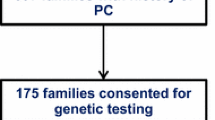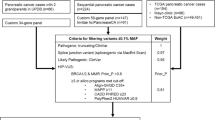Abstract
Screening programs for early detection and treatment of pancreatic cancer (PC) and its precursor lesions are increasingly implemented worldwide to reduce disease-specific lethality. Given the relatively low prevalence of the disease, the ideal target of such approaches is an enriched cohort of individuals harboring a lifetime risk of developing PC significantly higher compared to the general population, given either a substantial aggregation of PC cases in their family (i.e. familial pancreatic cancer) or a genomic landscape enriched with pathogenic variants associated with pancreatic carcinogenesis (i.e. mutation carriers). In Italy, a national registry for the census and surveillance of high-risk individuals for PC was launched in 2015, enrolling some 1200 subjects as of today. In this perspective, the scientific background, multi-level structure, and evolution of IRFARPC are outlined, as well as its long-term results, future developments, and areas for improvement.

Similar content being viewed by others
Data availability
No datasets were generated or analysed during the current study.
References
Siegel RL, Miller KD, Wagle NS, Jemal A (2023) Cancer statistics, 2023. CA Cancer J Clin 73:17–48
Blackford AL, Canto MI, Klein AP et al (2020) Recent trends in the incidence and survival of stage 1A pancreatic Cancer: a Surveillance, Epidemiology, and end results analysis. J Natl Cancer Inst 112:1162–1169
Overbeek KA, Levink IJM, Koopmann BDM et al (2022) Long-term yield of pancreatic cancer surveillance in high-risk individuals. Gut 71:1152–1160
Klatte DCF, Boekestijn B, Onnekink AM et al (2023) Surveillance for Pancreatic Cancer in High-Risk Individuals Leads to Improved Outcomes: A Propensity Score-Matched Analysis. Gastroenterology. ; 164: 1223–1231 e1224
Shah I, Silva-Santisteban A, Germansky KA et al (2023) Pancreatic Cancer screening for At-Risk individuals (pancreas scan study): yield, Harms, and outcomes from a prospective Multicenter Study. Am J Gastroenterol 118:1664–1670
Dbouk M, Katona BW, Brand RE et al (2022) The Multicenter Cancer of pancreas Screening Study: Impact on Stage and Survival. J Clin Oncol 40:3257–3266
Bartsch DK, Matthai E, Mintziras I et al (2021) The German National Case Collection for familial pancreatic carcinoma (FaPaCa)-Knowledge gained in 20 years. Dtsch Arztebl Int 118:163–168
Gangi A, Malafa M, Klapman J (2018) Endoscopic ultrasound-based pancreatic Cancer screening of high-risk individuals: a prospective observational trial. Pancreas 47:586–591
Chang MC, Wu CH, Yang SH et al (2017) Pancreatic cancer screening in different risk individuals with family history of pancreatic cancer-a prospective cohort study in Taiwan. Am J Cancer Res 7:357–369
Del Chiaro M, Verbeke CS, Kartalis N et al (2015) Short-term results of a magnetic resonance imaging-based Swedish screening program for individuals at risk for pancreatic Cancer. JAMA Surg 150:512–518
Mocci E, Guillen-Ponce C, Earl J et al (2015) PanGen-Fam: Spanish registry of hereditary pancreatic cancer. Eur J Cancer 51:1911–1917
Canto MI, Goggins M, Yeo CJ et al (2004) Screening for pancreatic neoplasia in high-risk individuals: an EUS-based approach. Clin Gastroenterol Hepatol 2:606–621
Gonda TA, Everett JN, Wallace M et al (2021) Recommendations for a more Organized and Effective Approach to the early detection of Pancreatic Cancer from the PRECEDE (pancreatic Cancer Early Detection) Consortium. Gastroenterology 161:1751–1757
Gonda TA, Farrell J, Wallace M et al (2022) Standardization of EUS imaging and reporting in high-risk individuals of pancreatic adenocarcinoma: consensus statement of the pancreatic Cancer Early Detection Consortium. Gastrointest Endosc 95:723–732e727
Huang C, Simeone DM, Luk L et al (2022) Standardization of MRI screening and reporting in individuals with elevated risk of pancreatic ductal adenocarcinoma: Consensus Statement of the PRECEDE Consortium. AJR Am J Roentgenol 219:903–914
Del Chiaro M, Zerbi A, Capurso G et al (2010) Familial pancreatic cancer in Italy. Risk assessment, screening programs and clinical approach: a position paper from the Italian Registry. Dig Liver Dis 42:597–605
Wang W, Chen S, Brune KA et al (2007) PancPRO: risk assessment for individuals with a family history of pancreatic cancer. J Clin Oncol 25:1417–1422
Maisonneuve P, Marshall BC, Lowenfels AB (2007) Risk of pancreatic cancer in patients with cystic fibrosis. Gut 56:1327–1328
Raimondi S, Maisonneuve P, Lohr JM, Lowenfels AB (2007) Early onset pancreatic cancer: evidence of a major role for smoking and genetic factors. Cancer Epidemiol Biomarkers Prev 16:1894–1897
Paiella S, Salvia R, De Pastena M et al (2018) Screening/surveillance programs for pancreatic cancer in familial high-risk individuals: a systematic review and proportion meta-analysis of screening results. Pancreatology 18:420–428
Paiella S, Secchettin E, Lionetto G et al (2023) Surveillance of individuals at high risk of developing pancreatic Cancer: a prevalence meta-analysis to Estimate the rate of low-yield surgery. Ann Surg
Hruban RH, Maitra A, Goggins M (2008) Update on pancreatic intraepithelial neoplasia. Int J Clin Exp Pathol 1:306–316
Canto MI, Harinck F, Hruban RH et al (2013) International Cancer of the pancreas Screening (CAPS) Consortium summit on the management of patients with increased risk for familial pancreatic cancer. Gut 62:339–347
Howes N, Lerch MM, Greenhalf W et al (2004) Clinical and genetic characteristics of hereditary pancreatitis in Europe. Clin Gastroenterol Hepatol 2:252–261
Bartsch DK, Sina-Frey M, Ziegler A et al (2001) Update Familial Pancreat cancer Ger Pancreatology 1:510–516
Balzano G, Capretti G, Callea G et al (2016) Overuse of surgery in patients with pancreatic cancer. A nationwide analysis in Italy. HPB (Oxford) 18:470–478
Paiella S, Capurso G, Cavestro GM et al (2019) Results of First-Round of Surveillance in individuals at high-risk of pancreatic Cancer from the AISP (Italian Association for the study of the Pancreas) Registry. Am J Gastroenterol 114:665–670
Capurso G, Paiella S, Carrara S et al (2020) Italian registry of families at risk of pancreatic cancer: AISP Familial Pancreatic Cancer Study Group. Dig Liver Dis 52:1126–1130
Hu C, Hart SN, Polley EC et al (2018) Association between inherited germline mutations in Cancer Predisposition genes and risk of pancreatic Cancer. JAMA 319:2401–2409
Rainone M, Singh I, Salo-Mullen EE et al (2020) An emerging paradigm for Germline Testing in Pancreatic Ductal Adenocarcinoma and Immediate implications for clinical practice: a review. JAMA Oncol 6:764–771
Paiella S, Capurso G, Carrara S et al (2023) Outcomes of a 3-year prospective surveillance in individuals at high-risk for pancreatic cancer. Am J Gastroenterol
Goggins M, Overbeek KA, Brand R et al (2020) Management of patients with increased risk for familial pancreatic cancer: updated recommendations from the International Cancer of the pancreas Screening (CAPS) Consortium. Gut 69:7–17
Pujol P, Barberis M, Beer P et al (2021) Clinical practice guidelines for BRCA1 and BRCA2 genetic testing. Eur J Cancer 146:30–47
Russo A, Incorvaia L, Capoluongo E et al (2022) Implementation of preventive and predictive BRCA testing in patients with breast, ovarian, pancreatic, and prostate cancer: a position paper of Italian Scientific societies. ESMO Open 7:100459
Canto MI, Almario JA, Schulick RD et al (2018) Risk of neoplastic progression in individuals at high risk for pancreatic Cancer Undergoing Long-Term Surveillance. Gastroenterology 155:740–751 e742
Fondazione N Valsecchi. In
Associazione Oltre la Ricerca ODV. In
Furniss CS, Yurgelun MB, Ukaegbu C et al (2021) Novel Models of Genetic Education and Testing for Pancreatic Cancer interception: preliminary results from the GENERATE Study. Cancer Prev Res (Phila) 14:1021–1032
Fujitani H, Eguchi H, Kochi Y et al (2023) Rare germline variants in pancreatic cancer and multiple primary cancers: an autopsy study. Eur J Cancer Prev 32:286–297
Wang T, Zhu T, Zhang Y et al (2022) Pan-cancer analysis of the prognostic and immunological role of BRCA1-associated protein 1 gene (BAP1): friend or foe? Gene 840:146765
Abe K, Kitago M, Kitagawa Y, Hirasawa A (2021) Hereditary pancreatic cancer. Int J Clin Oncol 26:1784–1792
Voutsadakis IA (2020) Landscape of BRIP1 molecular lesions in gastrointestinal cancers from published genomic studies. World J Gastroenterol 26:1197–1207
Shrivastava A, Mathur K, Verma RK et al (2022) Molecular dynamics study of tropical calcific pancreatitis (TCP) associated calcium-sensing receptor single nucleotide variation. Front Mol Biosci 9:982831
Hackeng WM, Hruban RH, Offerhaus GJ, Brosens LA (2016) Surgical and molecular pathology of pancreatic neoplasms. Diagn Pathol 11:47
Abe K, Kitago M, Kosaki K et al (2022) Genomic analysis of familial pancreatic cancers and intraductal papillary mucinous neoplasms: a cross-sectional study. Cancer Sci 113:1821–1829
Westphalen CB, Fine AD, Andre F et al (2022) Pan-cancer analysis of homologous recombination repair-associated gene alterations and genome-wide loss-of-heterozygosity score. Clin Cancer Res 28:1412–1421
Mandelker D, Marra A, Zheng-Lin B et al (2023) Genomic profiling reveals germline predisposition and homologous recombination Deficiency in Pancreatic Acinar Cell Carcinoma. J Clin Oncol 41:5151–5162
GENOMICA. In
Balzano G, Guarneri G, Pecorelli N et al (2023) Geographical Disparities and Patients’ Mobility: A Plea for Regionalization of Pancreatic Surgery in Italy. Cancers (Basel) ; 15
Archibugi L, Capurso G, Canto MI (2023) Cost-effectiveness of pancreatic cancer screening: time for a more tailored approach. United Eur Gastroenterol J 11:264–266
Overbeek KA, Koopmann BDM, Levink IJM et al (2023) Intraductal papillary mucinous neoplasms in High-Risk individuals: incidence, growth rate, and Malignancy Risk. Clin Gastroenterol Hepatol
Collaborators GBDI (2019) Italy’s health performance, 1990–2017: findings from the global burden of Disease Study 2017. Lancet Public Health 4:e645–e657
Peretti U, Cavaliere A, Niger M et al (2021) Germinal BRCA1-2 pathogenic variants (gBRCA1-2pv) and pancreatic cancer: epidemiology of an Italian patient cohort. ESMO Open 6:100032
Kenner B, Chari ST, Kelsen D et al (2021) Artificial Intelligence and early detection of pancreatic Cancer: 2020 Summative Review. Pancreas 50:251–279
Acknowledgements
FC is supported by the Umberto Veronesi Foundation. This work was supported by the Italian Ministry of Health and the Italian Foundation for the Research of Pancreatic Diseases (FIMP), project #CUPJ38D19000690001. The funding sources had no role in the study design, collection, analysis and interpretation of data, as well as manuscript drafting and decision to publish.This manuscript is dedicated to the memory of Massimo Canonica, Cosimo Caputo and Mario Sala, who passed away from pancreatic cancer and greatly supported pancreatic cancer research and the PROPH-ITA study.
Author information
Authors and Affiliations
Contributions
L.A. study planning, data collection, analysis and interpreting, manuscript drafting. The Author approved the final version of the manuscript.F.C. study planning, data collection, analysis and interpreting, manuscript drafting. The Author approved the final version of the manuscript.S.C. study planning, data collection, analysis and interpreting, manuscript drafting. The Author approved the final version of the manuscript.E.S. study planning, data analysis and interpreting, manuscript drafting. The Author approved the final version of the manuscript.M.F. study planning, analysis and interpreting, manuscript drafting. The Author approved the final version of the manuscript.G.C. study planning, data collection, analysis and interpreting, manuscript drafting. The Author approved the final version of the manuscript.S.P. study planning, data collection, analysis and interpreting, manuscript drafting. The Author approved the final version of the manuscript.
Corresponding authors
Ethics declarations
Competing interests
Salvatore Paiella receives consultancy honoraria from AlphaTau.
Additional information
Publisher’s Note
Springer Nature remains neutral with regard to jurisdictional claims in published maps and institutional affiliations.
This manuscript is dedicated to the memory of Massimo Canonica, Cosimo Caputo, and Mario Sala, who passed away from pancreatic cancer and greatly supported pancreatic cancer research and the PROPH-ITA study.
Electronic supplementary material
Below is the link to the electronic supplementary material.
Rights and permissions
Springer Nature or its licensor (e.g. a society or other partner) holds exclusive rights to this article under a publishing agreement with the author(s) or other rightsholder(s); author self-archiving of the accepted manuscript version of this article is solely governed by the terms of such publishing agreement and applicable law.
About this article
Cite this article
Archibugi, L., Casciani, F., Carrara, S. et al. The Italian registry of families at risk for pancreatic cancer (IRFARPC): implementation and evolution of a national program for pancreatic cancer surveillance in high-risk individuals. Familial Cancer (2024). https://doi.org/10.1007/s10689-024-00366-3
Received:
Accepted:
Published:
DOI: https://doi.org/10.1007/s10689-024-00366-3




